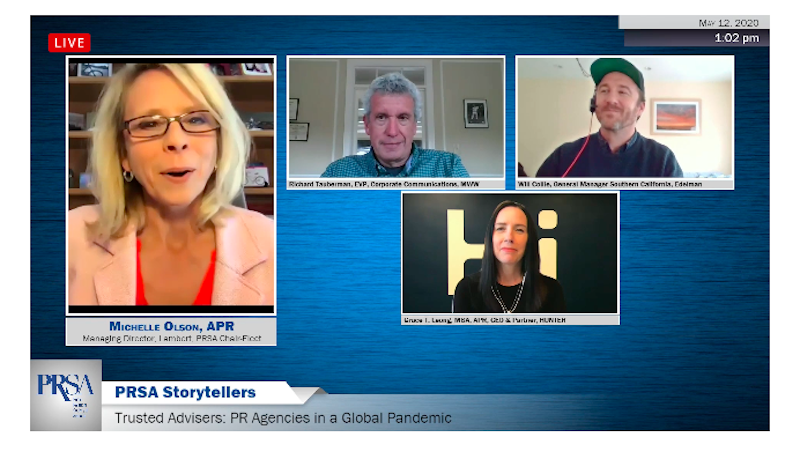In Brief: Agency Leaders on Best Practices; Reporters on the Media Landscape
By Greg Beaubien
June 2020
Agency Leaders on Best Practices During the COVID-19 Crisis
PRSA’s new Storytellers series debuted on May 12 with a webinar titled “Trusted Advisers: PR Agencies in a Global Pandemic.”
During the 60-minute session, moderated by Michelle Olson, APR, chair-elect of PRSA, panelists discussed how they are supporting their clients and employees during the COVID-19 outbreak.
For starters, leaders must be sure they are taking care of themselves. Just as you don your own oxygen mask before helping others in an airplane emergency, during the coronavirus pandemic, “First make sure you are whole as a leader, and then look around your agency and make sure the other leaders are prepared during this unprecedented time,” said Grace Leong, APR, CEO and partner of the Hunter agency in New York.
Will Collie, Edelman’s general manager for Southern California, also urged empathic communication. Edelman’s research shows that 60 percent of consumers are concerned about losing their jobs to the pandemic, he said.
“More than ever, brands are being judged by how they treat their own,” said Richard Tauberman, executive vice president of corporate communications for MWW in Washington, D.C. He recommended that companies communicate a consistent message to audiences, while also being sensitive to their situations. Find the full recap at PRsay.
Americans Support Government Financial Aid for Local News
Even as coronavirus makes local news reporting more important, the shutdown is worsening an already perilous financial situation for news organizations, especially local newspapers.
An April survey by the Gallup/Knight Foundation found Americans support directing federal money to local news organizations as part of coronavirus relief efforts. And while Americans support giving financial assistance to these news outlets, they’re probably not willing to personally pay for local news unless doing so already.
The survey also found that funding local news is a lower priority for Americans than providing support for local businesses or individuals affected by the coronavirus crisis.
The Changing Media Landscape
When pitching story ideas to journalists during the COVID-19 crisis, PR pros should use email, find local news angles and make experts available for video interviews, according to Cision’s “2020 State of the Media Report,” released on April 21.
The company’s 11th-annual report, which surveyed over 3,200 journalists from 15 countries, included a follow-up section on how PR pros can work with journalists to reflect the realities of the coronavirus shutdown.
Fifty-one percent of journalists say accurate content is more important than revenue, exclusivity or being first to publish, especially during COVID-19. With coverage now viewed through the lens of coronavirus, journalists are looking for optimistic, human stories.
PR professionals are advised to research news outlets and journalists before pitching stories. Smaller staffs and reduced resources continue to challenge reporters. In some cases, entire newsrooms have switched to covering coronavirus, and have put other stories on hold.
Mondays are best for pitching, the research finds. Emails to reporters should be concise and customized, with links that work and value that will not expire.
Should Workers Still Take Vacation Days?
People lucky enough to be employed from home during the COVID-19 crisis might have trouble separating their professional and personal lives. And those still working outside their homes are stressed by long hours and safety concerns.
As Money magazine reported on May 4, everyone needs a break. Even as U.S. companies lay off or furlough workers, taking a vacation day or two at home is still possible, and probably necessary.
“You’ve been producing at the same rate this entire time, so it’s totally appropriate to ask for a day off,” says Brenda Abdilla, a career and leadership coach. “Be unapologetic. If you’ve been in total hyper-mode, you really need to spend some time doing the opposite.”
Relaxing on the couch, enjoying a hobby or working around the house for a couple days won’t compare to a traditional vacation, but the breather can still help you feel refreshed when you return to your job, the magazine said.
“Resistance to taking time off right now is natural, but you have to push past it,” Abdilla says. “Don’t let your mind trick you into thinking that rest doesn’t matter.”



